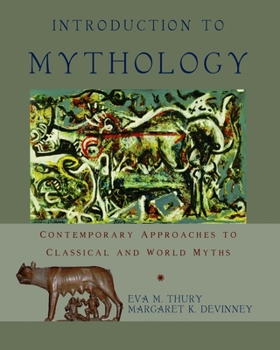Introduction to Mythology: Contemporary Approaches to Classical and World Myths
Select Format
Select Condition 
Book Overview
Introduction to Mythology: Contemporary Approaches to Classical and World Myths introduces students to a wide range of myths from various critical perspectives. Featuring original texts from sources around the world, it includes readings from Greek and Roman classics (by Homer, Hesiod, Ovid, and other writers); Nordic mythology (by Snorri Sturluson); Hindu culture (The Ramayana); and from such ancient works as The Epic of Gilgamesh and the Bible. Selections from Native-American sources and fairy tales and stories from Africa, Germany, and the United States are also included. In addition, authors Eva Thury and Margaret Devinney draw comparisons between classical myths and such contemporary cultural phenomena as The X Files, Star Trek, and Mother Goose. They also incorporate readings by Carl Jung, Levi-Strauss, Victor Turner, and other scholars who consider mythic material from different analytical perspectives. Finally, works by Milton, Keats, Updike, and Joyce are presented as examples of modern literary texts with mythological roots. The selections are organized into seven topical sections: myths of creation and destruction; hero and trickster myths; ritual and myth; myths and dreams; folktale and myth; modern American myths; and myths and literature.
Introduction to Mythology: Contemporary Approaches to Classical and World Myths employs an innovative pedagogical structure to help students unravel the complex web of literary allusions often found in mythological texts. Extensive marginal notes provide cross-references and explanations of terms and culture-specific concepts, while a glossary of deities, suggested readings for each chapter, and more than 200 illustrations, photographs, and maps further enhance the volume. Ideal for courses in classical and world mythology, this text can also be used in world culture, world literature, and comparative religion courses. An Instructor's Manual and a Student's Website featuring chapter objectives and summaries, key terms, study questions, self-tests, and off-site links of interest will accompany the book.
Introduction to Mythology: Contemporary Approaches to Classical and World Myths employs an innovative pedagogical structure to help students unravel the complex web of literary allusions often found in mythological texts. Extensive marginal notes provide cross-references and explanations of terms and culture-specific concepts, while a glossary of deities, suggested readings for each chapter, and more than 200 illustrations, photographs, and maps further enhance the volume. Ideal for courses in classical and world mythology, this text can also be used in world culture, world literature, and comparative religion courses. An Instructor's Manual and a Student's Website featuring chapter objectives and summaries, key terms, study questions, self-tests, and off-site links of interest will accompany the book.
Format:Paperback
Language:English
ISBN:019515889X
ISBN13:9780195158892
Release Date:December 2004
Publisher:Oxford University Press
Length:736 Pages
Weight:2.72 lbs.
Dimensions:7.4" x 1.3" x 9.1"
Customer Reviews
3 ratings
A Textbook that doesn't feel like one.
Published by Thriftbooks.com User , 18 years ago
This text is interesting in that it reads more like an anthology than a textbook. It is mostly composed of selections from the sourcetexts of the various myths, and when the authors do write their own material about the selections and such, their chapters feel more like news articles. This causes reading the book to feel more like reading a book for enjoyment than for being taught. I think this is a very positive thing, since the book feels less pedagogue-ish and yet is still quite informative. The only thing I see missing is family trees of the divine lineages, which would be most useful for studying Norse mythology, to use the most prominent example. I also found it unfortunate that the sections on Norse Myth use Sturluson's Prose Edda for the source text rather than the Poetic Edda, the more legitimate source. Apparently they did this to show how mythic texts rationalize their contents. In Sturluson's case, he decided to claim that the ancient Icelandic people simply forgot the Christian faith over time, even though the Germanic religion was practiced all over northern Europe for centuries before Christianity ever existed. Gotta love that medieval scholarship.
Wonderfully written
Published by Thriftbooks.com User , 20 years ago
I may be biased having had Dr. Devinney for a Prof a few times in the past, but this book is so well organized and clear that I recommend it to anyone. I was espically impressed with the structure!
Very pleased
Published by Thriftbooks.com User , 20 years ago
Book arrived in very good condition. Description of item was accurate. Will do business with them again.






